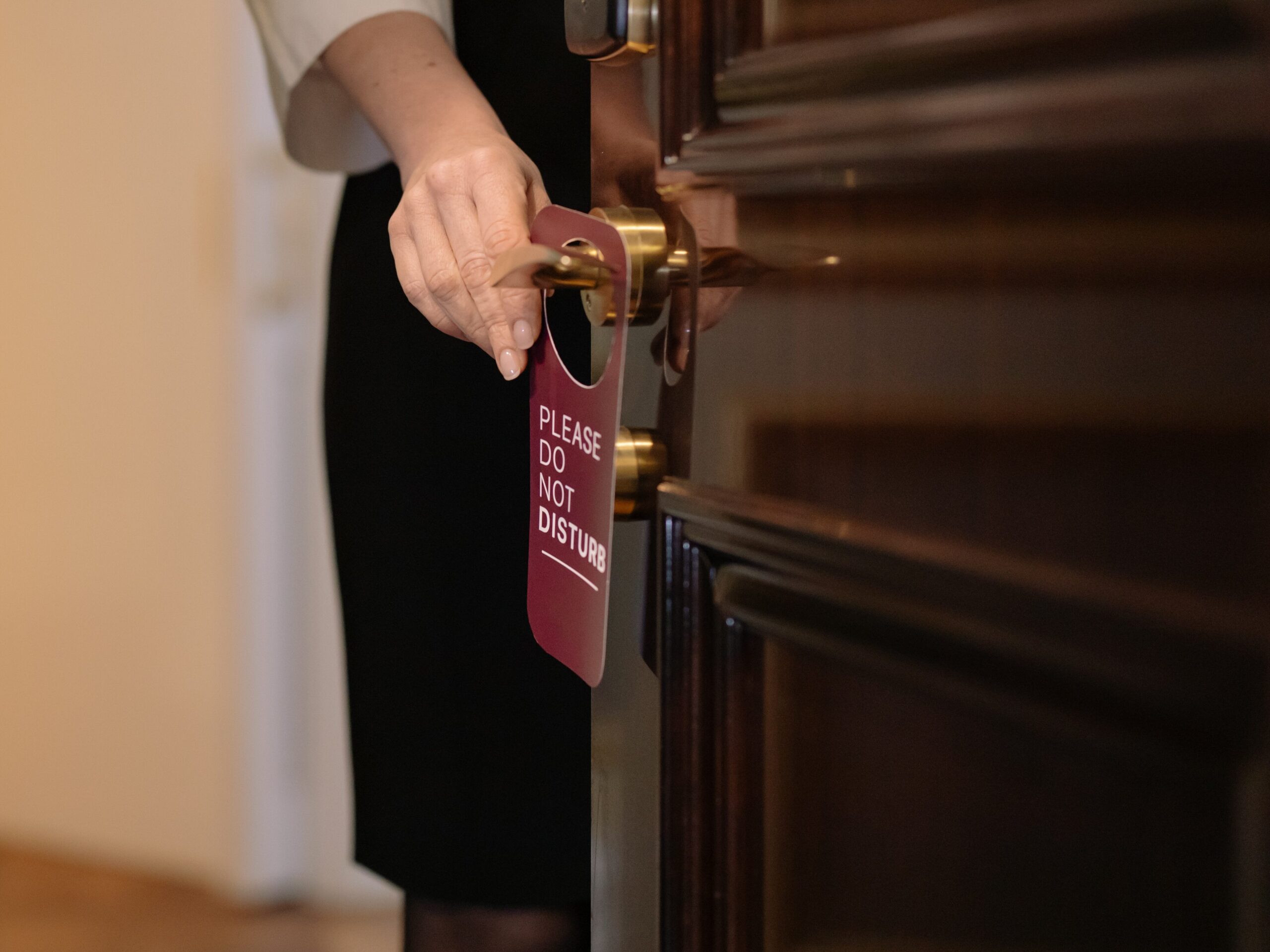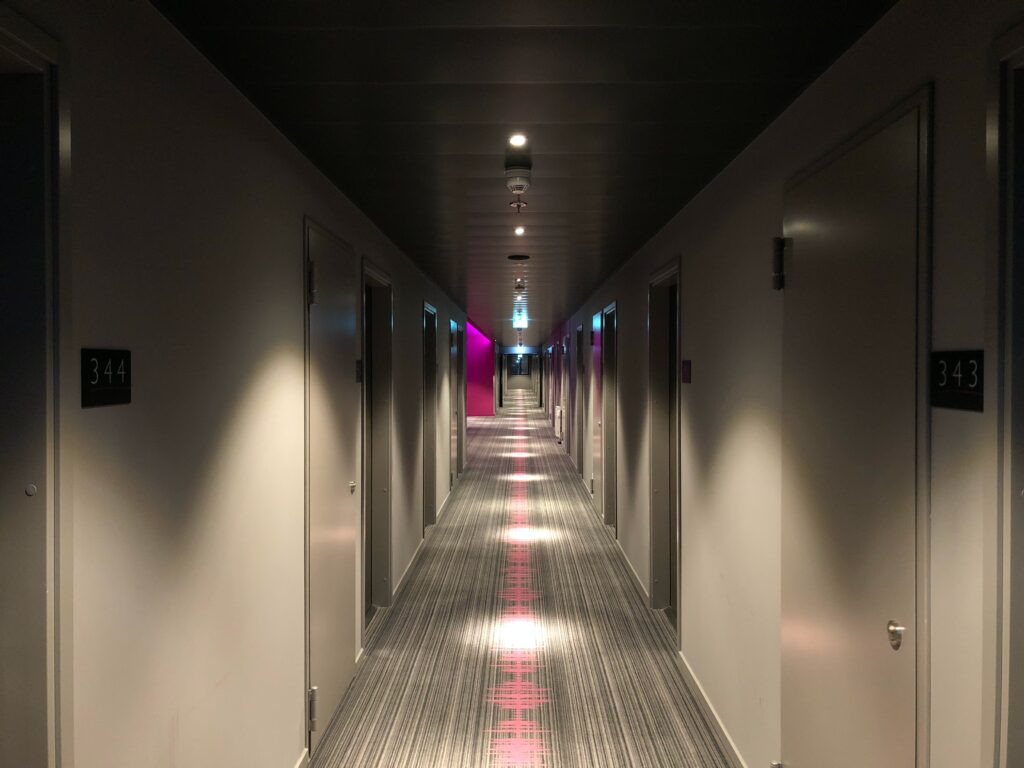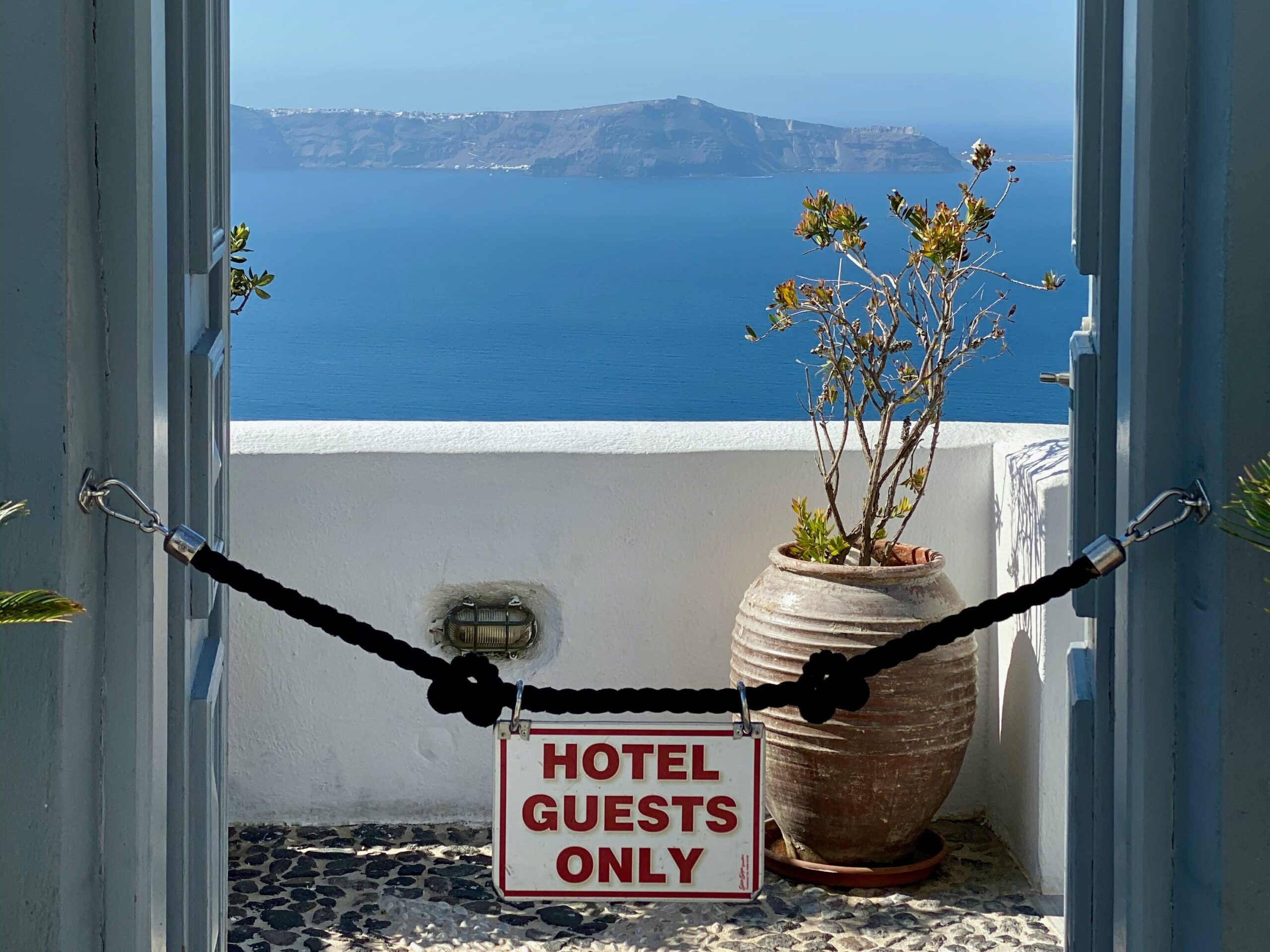Traveling is all about adventure – unique experiences and vibrant memories waiting to be made. Yet, no matter the destination, one constant remains – the significance of ensuring personal safety, particularly when it comes to hotels. After all, a safe and secure hotel stay forms the bedrock of a pleasant travel experience. You need peace of mind after, whether it’s after a day of work or relaxation.
That’s why this article aims to provide you with knowledge and give helpful hotel safety tips to remember. We will take a closer look at a range of methods to stay safe in a hotel, and particularly how DoorJammer, a portable device, can help ensure your security on the go.

11 Hotel Safety Tips
1. Booking A Hotel In A Safe Location
Your hotel safety can easily be impacted by location. When selecting a hotel, research the surrounding neighborhood to ascertain its safety profile. Online reviews, travel forums, and local news sources can offer invaluable insights. Avoid choosing hotels situated in high-crime areas or those that seem overly isolated.
A well-positioned hotel should be close to main roads, public transportation, and nearby the places you wish to visit. A safe location mitigates potential security risks and enhances your overall travel experience by providing easier access to local amenities and attractions.
2. Room Door Security With DoorJammer
Adding an extra layer of security to your hotel room can make your stay more secure and stress-free. DoorJammer is a useful gadget designed to prevent unauthorized entry by forcing the door to remain closed. This lightweight and portable device can be quickly installed on various floor types.
It comes in two versions: regular DoorJammer and DoorJammer Lockdown, with the latter being even sturdier and slightly larger. However, both can secure the door when the lock is compromised and withstand up to 1,000 pounds of direct force. They won’t damage the floor as they can be safely secured on any surface and won’t slip. So, if you want that extra bit of physical security, you won’t miss the mark with DoorJammer.
3. Ensuring Room Locks Are Functional
Once you arrive in your hotel room, it’s crucial to inspect the functionality of door locks. Make sure to check the primary lock, chain lock, and any additional safety bolts present. Functional locks are integral to the security of your room, so if you encounter any issues, ask for a room change without hesitation.
It might seem minor, but ensuring your room locks work properly is crucial. This step establishes the primary line of defense for your security during the hotel stay.

4. Control Over Room Access
Maintaining control over room access is a critical aspect of hotel safety. Hotels often allow guests to restrict access to housekeeping or maintenance staff. Try using the ‘Do Not Disturb Sign’ if you leave your room, and let in the cleaning personnel only when you’re present.
These measures can significantly minimize the risk of anyone gaining unauthorized access to your room and personal belongings, thus contributing to a safer hotel experience.
5. Safe Storage of Valuables
Proper storage of your valuables is a must during your hotel stay, so it’s best to use a safe when possible. If there’s no safe available, or you doubt its reliability, consult with the hotel staff about other secure storage options they might offer.
Leaving your valuable items in plain sight when you’re not in the room could be tempting for opportunistic thieves. Therefore, picking a secure place for storage is vital.

6. Staying Aware Of Your Surroundings
Being aware of your surroundings is another critical safety measure. Explore the hotel layout, and get to know where the emergency exits, fire extinguishers, and stairways are. If you notice any early signs of fire, don’t hesitate to report it to the hotel staff.
Remember, staying aware isn’t about fostering paranoia but maintaining informed alertness that can contribute to your safety.
7. Safe Use Of Hotel Wi-Fi
Using hotel Wi-Fi networks safely is of paramount importance. Cybercriminals can often target public networks, including those in hotels. Avoid conducting transactions or accessing personal accounts while connected to hotel Wi-Fi to protect sensitive data.
Consider using a Virtual Private Network (VPN) for a more secure connection for personal data access. Also, verify the Wi-Fi network name with hotel staff before connecting to prevent accidentally joining a malicious network.
8. Avoid Posting Your Location Online
In the age of social media, it’s tempting to share your holiday experiences, including your hotel location, immediately. However, publicly sharing your current location can be exploited by potential criminals to track your movements.
Resist the urge to post your location or check-ins in real-time. Save those updates and photos for when you return home to ensure your whereabouts aren’t publicly accessible during your trip.
9. Understanding Fire Safety
Understanding the fire safety measures of your hotel is vital. Make an effort to identify the nearest emergency exits and familiarize yourself with the sound of the fire alarm. Review the evacuation procedures usually posted on the back of your room’s door. Although this tip is basic, it’s best to always be prepared.

10. Not Opening the Door to Strangers
Hotel stays, particularly in unfamiliar locations, can sometimes attract unwelcome attention. Remaining vigilant is one of the more critical aspects of safety, and it’s best not to open your hotel room door to just any stranger. Even if visitors identify as hotel staff, it’s crucial not to grant them access immediately.
Call the reception if someone knocks on your door and identifies as hotel staff. Be particularly cautious of unexpected room service or maintenance visits, which could be a guise for malicious intent. Also, remember to use the peephole or video doorbell if available, as they allow you to verify your identity without touching the door handle.
11. Regularly Checking Credit Card Statements
While traveling and exploring new places, it’s easy to overlook the small yet crucial task of monitoring your credit card activity. Regularly check your credit card statements for unauthorized charges, mainly if you’ve used your card at the hotel.
Most banks offer the feature of transaction notifications, which, when enabled, can alert you of each transaction made on your credit card. This feature lets you instantly detect fraudulent activity and report it to your bank, mitigating potential financial loss.
A careful review of your credit card statements can prevent unwanted financial surprises and give you peace of mind throughout your trip. Regular checks are a small price for maintaining financial safety and ensuring a stress-free hotel stay.
Conclusion
Your stay at a hotel, whether for leisure or business, should be a comforting experience, free from worries about personal safety or security. By implementing these 11 essential hotel safety tips, you can enjoy your stay with peace of mind and focus on the purpose of your trip, be it work, relaxation, or exploration.
Choosing the right hotel is the first step toward a secure stay. Use a DoorJammer for added security, ensure the room locks are functional, and always control who has access to your room. Maintain awareness of your surroundings, use the hotel Wi-Fi safely, and avoid posting your location online. Understanding fire safety, securing your room while inside, and not opening the door to strangers are essential practices. Finally, secure your valuables and check your credit card statements for discrepancies.
These hotel safety tips apply to any hotel and can be adapted to any type of accommodation to ensure your safety. The goal is not to instill fear or anxiety about hotel stays but to encourage proactive habits that enhance safety. After all, being prepared is always a better alternative to being caught off guard. Happy travels!